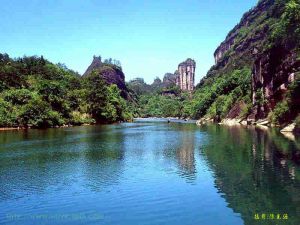Difference between revisions of "Mount Wuyi"
imported>Graceshanshan |
imported>Ciic m |
||
| (One intermediate revision by one other user not shown) | |||
| Line 1: | Line 1: | ||
| − | '''Mount Wuyi''', lying in northern [[Fujian Province]], covers an area of 60 square kilometers. Most of the hills here are made of red sandstone, very steep but flat on the top. The peaks and rocks of grotesque shapes are girded by clear streams and embraced by green trees and bamboo plants. The Nine-bend River, 60 kilometers long, meanders among the hills, presenting the most charming tourist route in this scenic zone. | + | '''Mount Wuyi''', lying in northern [[Fujian Province]], covers an area of 60 square kilometers. Most of the hills here are made of red sandstone, very steep but flat on the top. The peaks and rocks of grotesque shapes are girded by clear streams and embraced by green trees and bamboo plants. The Nine-bend River, 60 kilometers long, meanders among the hills, presenting the most charming tourist route in this scenic zone.[[File:wuyi.jpg|thumb|right|Mount Wuyi]] |
Mount Wuyi has a long cultural history. The site of the Wuyi Palace built in the seventh century for emperors to conduct sacrificial activities remains today. It had been an important center of China's [[Taoism]] and was listed as one of the top nine [[Taoist Temples]] in the 10th century. The mountain also boasts many other cultural relics including stone inscriptions. | Mount Wuyi has a long cultural history. The site of the Wuyi Palace built in the seventh century for emperors to conduct sacrificial activities remains today. It had been an important center of China's [[Taoism]] and was listed as one of the top nine [[Taoist Temples]] in the 10th century. The mountain also boasts many other cultural relics including stone inscriptions. | ||
| Line 5: | Line 5: | ||
In 1999, Mount Wuyi entered the lists of world cultural and natural heritage. | In 1999, Mount Wuyi entered the lists of world cultural and natural heritage. | ||
| − | [[Category:Mountains | + | [[Category:Mountains]][[Category:World Heritage Sites]] |
Latest revision as of 01:12, 4 August 2009
Mount Wuyi, lying in northern Fujian Province, covers an area of 60 square kilometers. Most of the hills here are made of red sandstone, very steep but flat on the top. The peaks and rocks of grotesque shapes are girded by clear streams and embraced by green trees and bamboo plants. The Nine-bend River, 60 kilometers long, meanders among the hills, presenting the most charming tourist route in this scenic zone.
Mount Wuyi has a long cultural history. The site of the Wuyi Palace built in the seventh century for emperors to conduct sacrificial activities remains today. It had been an important center of China's Taoism and was listed as one of the top nine Taoist Temples in the 10th century. The mountain also boasts many other cultural relics including stone inscriptions.
In 1999, Mount Wuyi entered the lists of world cultural and natural heritage.
